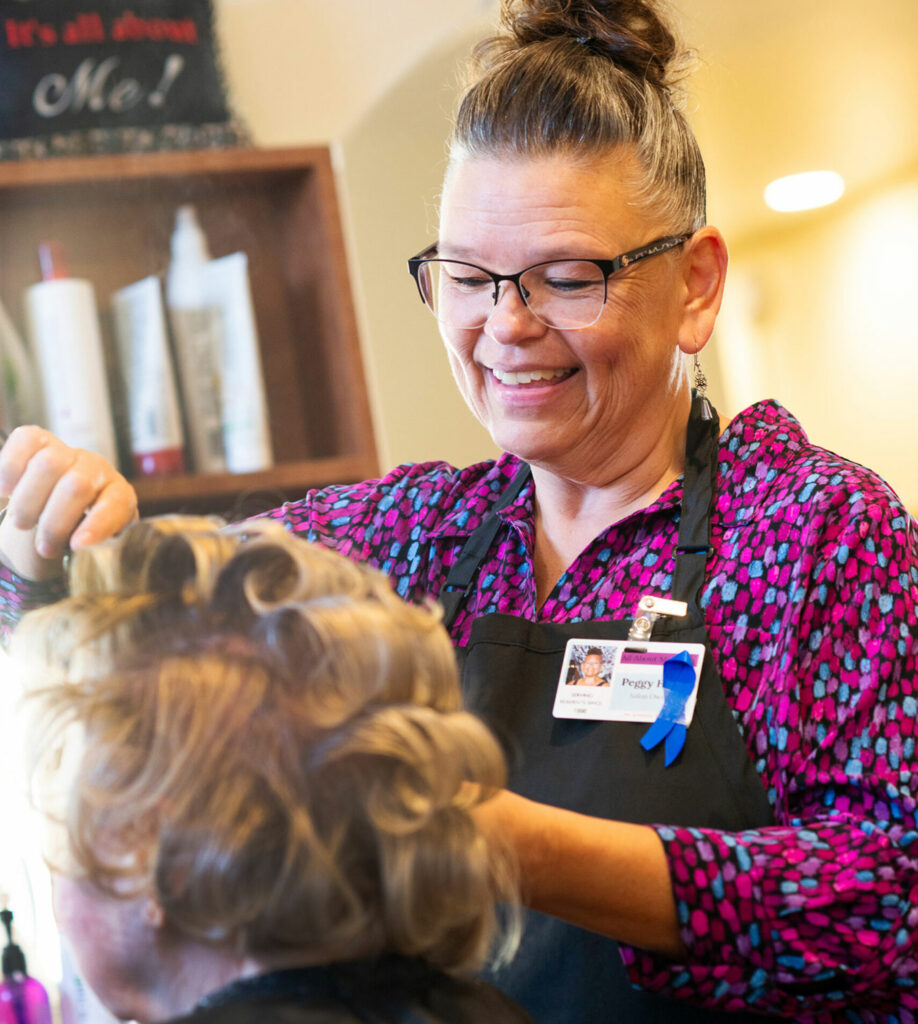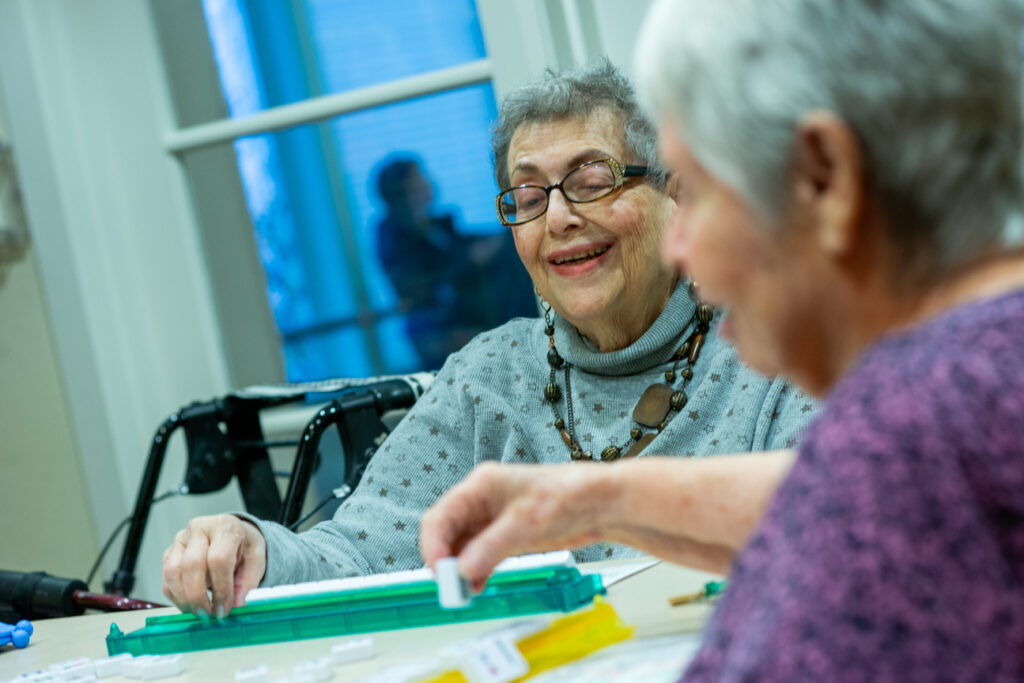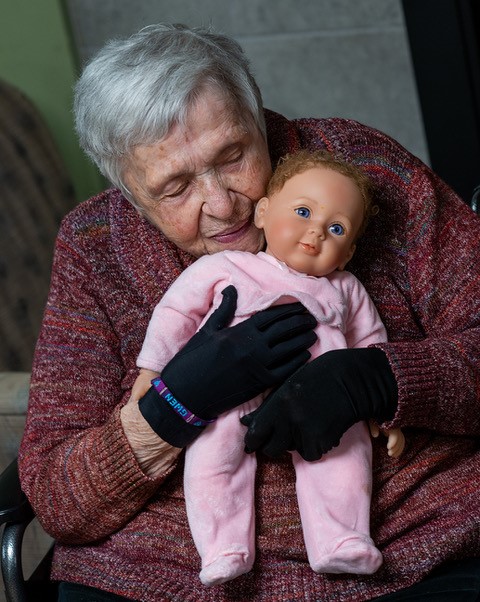
When you look good, you feel good
In April of 1998, a then 27-year-old Peggy Henry answered an ad in the Oregonian for a part-time hair stylist at a new assisted living facility in Portland called Rose Schnitzer Manor.
“The first few residents of the May Apartments had moved in during January of that year,” said Peggy. “Flo McWillis hired me Flo’s husband, Stan, was an accountant at Robison, and we were just waiting for the salon to be ready.
“The place filled up quickly, so it didn’t take long before we were both busy every day. My daughter was four-years-old at the time, and I wanted to be home for her, and my son, but nights and weekends are part of this profession. No nights and weekends are unheard of, and definitely a happy highlight for me.”
When Flo retired in 2016, Peggy became sole proprietor of the state-licensed salon that she named All About Me, offering hair and nail services to our residents, about 40 per week . . . or more, if needed! She recently began offering hair care at Robison on occasional Saturdays, too.
Resident Freda has lived at Rose Schnitzer long enough to have had her hair done by Flo. She loves sitting under the dryer, and receiving hair care weekly, as it’s relaxing, but wrinkles her nose at the hair spray that will hold her set for the next seven days.
“You look great, Freda!” she is told upon departure.
“I always look like that when she does my hair!” says Freda, with a smile.
“I love seniors,” said Peggy. “The residents have all become family. I consider myself half Jewish, even though I’m not any religion.
“Getting to know the residents is my favorite part, and now that I’ve been here so long, I’m meeting children of parents whose hair I did 20 years ago. There have been residents whose parents’ hair I styled when they lived here.
“My job takes a bit of caregiving and a bit of hairdressing.”
Peggy walks down the corridor to pick up Resident Gerry for her weekly appointment, and knocks on Gerry’s door.
“Do you want to bring your sweater, or leave it here?” Peggy asks. Gerry elects to wear her sweater.
I’m always excited to get my hair done,” said Gerry. “It’s so nice.”
Peggy guides Gerry back to the salon, chatting as she goes. “Gerry, we’re rounding the corner here to the salon. Don’t forget there’s a little lip there. I call that the speed bump when I’m pushing people in wheelchairs because it looks little, but it feels big when you’re going in a chair.”
“My job takes a bit of caregiving, and a bit of hairdressing.”
Many of the residents, like Freda and Gerry, receive shampoo sets, which is a wash and comb out, back to front. The technique is a fading art, notes Peggy, “but it’s not easy to do; shampoo sets take a lot of back combing with rollers.”
Because Rose Schnitzer Manor has a large number of residents, Peggy believes she is likely one of the busiest hair stylists in an assisted living community in Oregon.
“How’re you doing, Gerry? Does the water feel good?” asks Peggy.
Gerry concurs. A former antiques dealer who owned a business with her husband, John, she shares that her hair was very dark as a child; her classmates even asked the teacher if Gerry was a gypsy.
“I thought you might have been a brunette,” said Peggy. “Typically, people whose hair has more white than gray had very dark hair as children.”
Peggy can’t see over the evergreens out the windows now. But she remembers the campus’s 10-acre woods being low enough that she could look over the trees out to the streets and adjoining neighborhoods. She said goats roamed the woods to chew down the excess foliage; one day a goat ran right into the Rose Schnitzer Manor lobby. There was a soda fountain in the Manor, where the Stop N’ Shop now resides, where residents could order a “pop.” A shampoo set from Peggy and Flo was $10, and a tube of color was $3; prices have risen to $30 and $20 respectively.
Living at Rose Schnitzer Manor is a little like taking a cruise, observed Peggy. “Residents awake, go to an activity, and then a meal, and then another activity. And in the early days, residents dressed for dinner,” said Peggy, meaning they traded in their day clothes for evening wear.
“They had to be downstairs at a certain time dressed for dinner,” she said. “I couldn’t get anyone to take an appointment after 3 in the afternoon!”
Peggy was born in St. Helens, Oregon, and grew up in Milwaukie. She has two children, and three grandchildren, and watches her four-year-old granddaughter every Monday. She also attends as many of her grandson’s sporting events as possible.
Residents often give her advice: to save money, and travel as much as she can, and she is listening, though she intends to work for years to come.
“I’m not going anywhere,” said Peggy. “I am comfortable, have a routine, an love my job.”
Peggy would love a hair styling partner in the salon so she could take on the hair of residents’ families. “If you hear of anyone, let me know!” she said.
Resident Betty has arrived for her appointment. What does she think of Peggy’s hair care?
“She’s an incredible person,” said Betty. “All her clients love her.”
Agrees Renee: “You make a lot of people happy!”

https://cedarsinaipark.org/wp-content/uploads/2024/06/12.28.23-Weekly-Bulletin.pdf

https://cedarsinaipark.org/wp-content/uploads/2024/06/12.21.23-Weekly-Bulletin.pdf

https://cedarsinaipark.org/wp-content/uploads/2024/06/12.14.23-Weekly-Bulletin.pdf

https://cedarsinaipark.org/wp-content/uploads/2024/06/12.7.23-Weekly-Bulletin.pdf

By Sydney Clevenger, with scheduling assistance from Rose Schnitzer Manor Active Assisted Living Resident Arlene Layton
With all that’s happening in the world, particularly since Covid, aging with grace has become an even tougher task.
What makes some individuals more resilient to life’s ups and downs?
We asked three elders at Cedar Sinai Park‘s Rose Schnitzer Manor Active Assisted Living—Eva,
By Sydney Clevenger, with scheduling assistance from Rose Schnitzer Manor Active Assisted Living Resident Arlene Layton
With all that’s happening in the world, particularly since Covid, aging with grace has become an even tougher task.
What makes some individuals more resilient to life’s ups and downs?
We asked three elders at
Cedar Sinai Park's
Rose Schnitzer Manor Active Assisted Living—Eva, Reva, and Eve— for tips on keeping positive, active, and engaged. That scheduling a get-together with the three ladies was a task unto itself—they had only a short window of time between a friends’ lunch, Mah Jong, and a mindfulness lecture—leads to tip number one.
- Socialization
Our seniors agreed that it is important to be independent, but also to have people around regularly.
“I thrive on people,” said Eva, 89. “I suggest for people to get involved and not live by themselves.”
Reva, 81, agrees that isolation can be a recipe for negativity. “Finding peers with whom to share and not depending upon your children for entertainment is important,” she said. “Sometimes, my daughter who lives in the town I live in will call and ask me to dinner. And I’ll say ‘Gee, I’d like to, but I’m doing such and such.’ That’s the kind of relationship I want. There are people where I live that I can talk to and socialize with and enjoy.”
Adds Eva: “I can’t imagine staying in a house by myself and thinking that’s good living. The TV doesn’t give much interaction. Here, I can walk out of my room and talk to the staff or visitors and it’s very nice.”
- Humor
Eva hails from California most recently, and Reva from Connecticut. They didn’t know each other previously before living in a senior community. But they hit it off right away due to their similar humor.
“I got here about a month before Reva did,” said Eva. “And when she came into the dining room, she was looking for a place to sit. She came to my table and we just hit it off. We’ve sat together ever since, and our group has grown. We just have a great time together. We love to confuse the servers when they ask our names since their names rhyme. We always say if we were ever in the same school at the same time, the two of us would have been expelled. We laugh a lot. It helps; it really does.”
- Purpose
For Reva, playing games like bridge, Scrabble, and Mah Jong keep her mind active. And she starts every day by playing a round of Wordle. “Got it in three this morning,” she said. “I did, too!” said Eva.
Eve, 94, suggests focusing on what you can do, and what you want to do, rather than what you can no longer do. “A woman came into my office when I was still working and said, ‘You know, my mother gets up in the morning and she goes into the bathroom, looks in the mirror, and says, ‘Oh, I’m so glad to see you!’ I thought that was a very good attitude,” said Eve.
Reva said elders should take the opportunity to try new experiences. She was recently inspired by a fellow resident who went to France at age 98 for a World War II ceremony.
“That made me think . . .maybe I could travel at age 98!” said Reva.
“Never say never,” added Eve.
###

https://cedarsinaipark.org/wp-content/uploads/2024/06/11.30.23-Weekly-Bulletin.pdf

Everyone needs a little comfort now and then.
That’s why many elements of our robust Life Enrichment program for residents in long-term care involve activities that evoke strong memories. Activities that residents in long-term care enjoyed in their lives previously—arranging flowers, painting, planting, cooking—all are strategically incorporated into our model program. Such activities are especially important for residents with dementia, or in the middle to late stages of Alzheimer’s.
To help elders who have a strong need to nurture,
Everyone needs a little comfort now and then.
That's why many elements of our robust Life Enrichment program for residents in long-term care involve activities that evoke strong memories. Activities that residents in long-term care enjoyed in their lives previously—arranging flowers, painting, planting, cooking—all are strategically incorporated into our model program. Such activities are especially important for residents with dementia, or in the middle to late stages of Alzheimer’s.
To help elders who have a strong need to nurture, staff in Robison Jewish Health Center/Harold Schnitzer Center for Living often offer comfort objects like stuffed kittens and soft smiling baby dolls.
“For residents who are upset or wandering, the kitties and babies are what we call an intervention to soothe and comfort,” said Justine May, social service coordinator. “The look of relief on our residents’ faces when we offer the babies or kitties for comfort is noticeable.
“I think nurturing and mothering and loving is so natural that the babies and kitties help a lot of residents.”
Resident, Gwen, for example, had to leave her beloved cat behind when she moved to long-term care. “The companionship that she’d always had from her kitty at home made it a natural for her to love her stuffed kitty,” said Justine. Gwen used to take her kitty to activities; now she can often be found with her baby doll.
Comfort objects help residents communicate affection, and “give us another way to interact with residents,” said Justine. “The comfort objects are a topic of conversation we can use to elicit memories.
“We are happy the comfort objects are handy whenever residents need them.”

https://cedarsinaipark.org/wp-content/uploads/2024/06/11.22.23-Weekly-Bulletin.pdf

https://cedarsinaipark.org/wp-content/uploads/2024/06/11.16.23-Weekly-Bulletin.pdf












